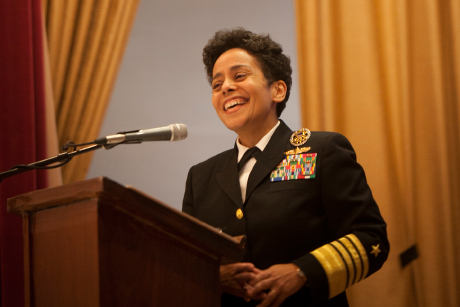On Veterans Day, admiral talks WASPs and women heroes
By Abigail Warren

In the keynote address at a daylong celebration of Cornell veterans and military personnel on campus Nov. 11, Adm. Michelle J. Howard, vice chief of naval operations, recalled the service of Women Airforce Service Pilots (WASP) during WWII and early feminist leaders.
Howard, the highest-ranking woman in the history of the United States Navy and the first African-American woman to command a U.S. Navy ship, the USS Rushmore, reflected on Cornellian WASP Dawn Seymour ’39, one of 13 women to fly a B-17 bomber during WWII.
The WASPs were a crucial force in the war effort, ferrying 50 percent of aircraft moved between military bases. Seymour and other WASPs took risks and made significant sacrifices, Howard said. As a training drill, they piloted planes towing targets at which male pilots shot live ammunition. In total, 38 WASPs were killed during WWII. Despite their bravery and selfless service, Howard explained, “WASPs’ contribution to the war effort was not considered military service,” and they did not receive military benefits equivalent to their male counterparts.
Remembering the WASPs today is important, Howard said: “We recall the stories of our forebears to reassure them and ourselves that we have not forgotten their work, their stories, their passions or their sorrows.”
Howard turned to the efforts nonmilitary American women who promoted justice for all, including abolitionists Lucretia Mott and Elizabeth Cady Stanton. After being barred from international anti-slavery conferences because of their gender, Mott and Stanton organized the Seneca Falls, New York, convention in 1848 to discuss the social, civil and religious conditions of women.
“The women used the opportunity to publicize the grievances against their sex including their unequal status as citizens,” said Howard. Mott and Stanton called upon the country to address issues including women’s lack of property rights, lack of recognition in the church and inequality in marriage.
“These women were responsible for redefining the meaning of the word citizen,” Howard said. “And I believe they saw it as their duty to fight for their rights. They are heroes of our American history whose perseverance … has contributed to the freedoms and ideals of our country. Through their selfless devotion to equality, the constitution is more inclusive and even more inspiring.”
In recognizing the contributions, small and large, of our predecessors, Howard said we can recognize the heroism and sacrifices of the men and women who never seek that recognition for themselves.
Howard said that on this Veterans Day, “Women like Dawn and Elizabeth Cady Stanton are the reasons we can say the word citizen, pilot, patriot and veteran and know those words can apply to any American.”
The talk was sponsored by the Department of Inclusion and Workforce Diversity, Navy ROTC, Women of Color Colleague Network Group and Veterans Colleague Network Group.
Abigail Warren ’15 is a writer intern for the Cornell Chronicle.
Media Contact
Get Cornell news delivered right to your inbox.
Subscribe